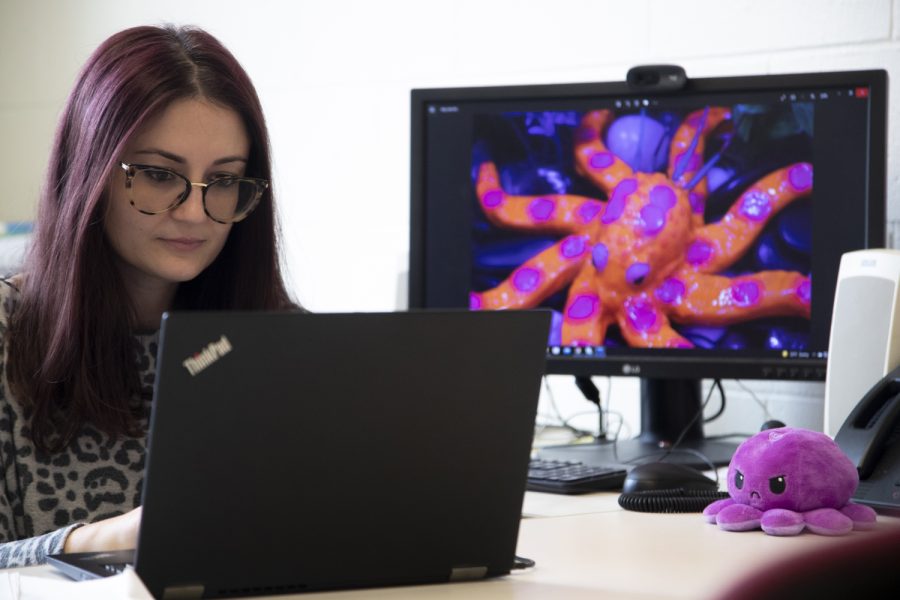UI Assistant Professor creates cephalopod-inspired ‘softopus’ robot with Office of Naval Research funds
Caterina Lamuta, an assistant professor of mechanical engineering, will apply her previous research to create an underwater robot designed to have similar motor and textural features to that of an octopus.
Professor Caterina Lamuta works in her office in the Seaman’s Center Oct.13, 2022.
October 18, 2022
A University of Iowa College of Engineering professor is expanding the understanding of underwater technology by creating a cephalopod-inspired soft robot, nicknamed “Softopus,” which mimics the features of an octopus. Caterina Lamuta, an assistant professor of mechanical engineering, was awarded the U.S. Office of Naval Research’s 2023 Young Investigator Program. This year’s competitive program selected 25 out of over 170 applicants seeking to receive funding for their proposed research.
Over a three-year period, Lamuta will receive $502,242 to complete her project “Softopus:” A Cephalopods-inspired Intelligent Soft Robot for Sensing, Manipulation, Locomotion, and Texture Modulation.”
Lamuta said she finds inspiration from nature — including sea creatures.
“I thought that if we need a soft rubber, which is lightweight for underwater applications, we should take inspiration from real soft animals that swim and do a lot of crazy things in the water,” she said.
The Softopus will be able to modify its texture, camouflaging into its surroundings using twisted spiral artificial muscles. The artificial muscles appear as minuscule conical springs that can extend when voltage is applied, changing the roughness of the robot’s skin. This behavior imitates papillae, the muscles in cephalopods that control skin protrusions.
Lamuta received a Young Investigators Award in 2021 from the Defense Advanced Research Projects Agency to develop the “smart skin,” which can reduce drag and shed biofilms — the bacteria that builds up on web surfaces. By having the ability to detach biofilms, the robot is designed to be self-cleaning, Lamuta said.
RELATED: UI researchers make artificial muscles with grant
“I get excited about octopi in general. They have so many functions that take a look at something that we can really do, and there was not a lot done in literature at the time, so I thought it would be worth exploring,” Lamuta said.
This is not the first award Lamuta has received from the Office of Naval Research. The Office granted her $430,000 in 2019 to improve the artificial muscles she developed as a postdoctoral fellow at the University of Illinois Urbana-Champaign with professors Sameh Tawfick and Nancy Sottos.
According to their study published in Smart Materials and Structures, the artificial muscle consisting of twisted and coiled fibers can lift up to 12,600 times their own weight with very small input voltage.
Lamuta’s current Softopus project builds from her previous research and will include the two artificial muscles — the actuators that cause the robot to operate — in the tentacles of the robot.
The tentacles will help the robot grasp and move objects and crawl underwater.
Ching-Long Lin, UI professor and departmental executive officer of mechanical engineering, said Lamuta’s invention is the first of its kind.
“If the project is completed successfully, the owner could use it for underwater monitoring, rescue, maintenance, and lots of applications,” he said.
Lin said bio-inspired mechanics like the Softopus robot rely on observing how biological systems can solve problems and can use these findings to improve current technology.
“Some things are beyond our imagination, and that’s why we have to learn from nature,” he said.














